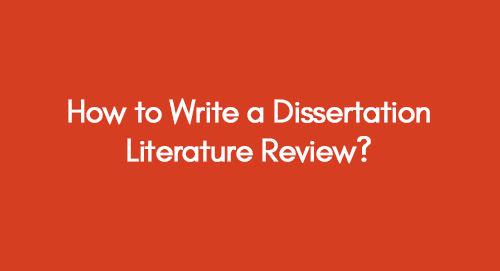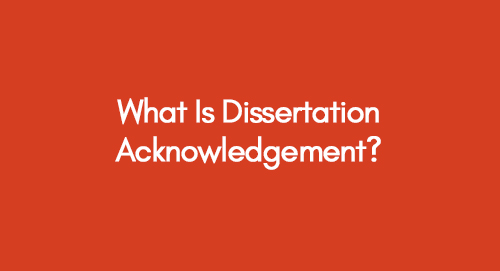
How to Write a Dissertation Literature Review?| Steps
August 15, 2022
What is a Dissertation Acknowledgement? A Useful Guide
August 17, 2022In many ways, a dissertation proposal resembles a research proposal. An outline of a student's research interests is written in this document. You must submit the proposed idea for approval or rejection to your dissertation advisor. Embark on your research journey with confidence by mastering the skill of writing a compelling dissertation proposal. Our step-by-step guide on 'how to write a dissertation proposal' has you covered.
An effective dissertation proposal presentation also describes the methods for obtaining data and how it will be analyzed. Research proposals are primarily used to convince experts that your research will significantly impact. To ensure your proposal is well-structured and impressive, make sure to write it well.
A dissertation proposal is an important part of your master's or doctoral dissertation. The plan outlines the work you must do to complete the degree in the future.
Dissertation proposals vary in length depending on the field. Nevertheless, longer proposals usually take more than 20 pages, while shorter ones are typically 9 to 10 pages long.
The following should be included in a dissertation proposal:
- The purpose and topic of your paper
- The current state of knowledge is reviewed in a literature review
- Describe the methodology you plan to use
- Implications of the research are discussed
- Resources cited in a bibliography
Pro Tip: Your institution may give you specific guidelines regarding your dissertation proposal's length and structure, so ensure you follow those guidelines and ask your supervisor if you have any questions.
Why is a Proposal So Important?
The proposal for your dissertation is very important in your postgraduate studies. It shapes your dissertation, a big deal in your academic journey. If your proposal is well-organized, it's like having a clear roadmap. Your dissertation's quality matters for your postgraduate success and final grade.
In addition to developing research and communication skills, writing a dissertation will help you prepare for future employment and career success. Your dissertation will succeed if you understand the current research on your chosen topic and keep your bibliography current.
Benefits of the Dissertation Proposal
Developing a dissertation proposal is the first step of the dissertation process, and this proposal typically focuses on supporting the chosen topic's relevance and the research methodology's suitability. Here are the advantages dissertation proposals offer for your research.
Providing Communication
Writing a dissertation proposal has a significant outcome. Exactly how? Here's how it works. Proposals communicate between you and those who provide advice, consent, or funds to your research.
For the implementation of the research project, the dissertation committee places its final approval on the dissertation proposal. In addition, it facilitates the final confirmation of funding agencies. Your ability to get financial support depends directly on how clear and thorough your proposal is.
It Creates a Plan
You are going to implement your plans in action based on your proposal. A strict set of observations is preplanned and incorporated into all empirical research included in the proposal. Your dissertation proposal will be judged based on the arguments and explanations you provide.
When you present your proposal, it explains the plan in step-by-step detail.
Pro Tip: Your dissertation methodology will run more smoothly if you have a detailed plan that anticipates problems in advance. Good dissertations are thorough and detail-oriented enough to allow another researcher to continue the study in the future.
Contract
Once your proposal is finished, it needs approval from the sponsoring committee. If the proposal is well-done and thorough, you should be able to create a good and acceptable final report. You and the sponsoring committee sign an agreement when you receive the final confirmation. It's advised to make only minor changes after the agreement is signed.
Data collection should take place only after the proposal has been finalized.
Note: A contract should not be altered unilaterally by students or faculty members after it has been finalized.
The Process: Steps of Generating a Dissertation Proposal
For each subject, dissertation proposals follow a specific format, but they generally include some or all of the following sections. Our discussion here will focus on the common framework for proposals.
1: Crafting an Appealing Topic/Idea
Prior to drafting your proposal, ensure a solid dissertation idea. Engage with preliminary materials within your field of interest. Analyze existing viewpoints and identify intriguing research gaps. Define your objectives and refine your focus to a feasible and specific topic. Transition from a wide field to a precise niche.
Example: Poems by Shakespeare > Poems of Shakespeare on Love > Sonnets 102 and 145
2: Coming Up with an Introduction
The introduction of a dissertation proposal also follows the format of other academic assignments. Providing background information, presenting objectives, and outlining research questions are key aspects of the dissertation introduction.
Depending on your topic, you may want to consider writing a hook statement. In order to understand the proposed questions, give more background information and area context. In addition, explain what existing research there is on the topic idea and what your dissertation will contribute to it.
Pro Tip: Do not add too much detail at this stage if you are planning to do a literature review. Briefly summarize the research study instead.
It is also necessary to define and specify the aims and objectives of the research. Do not ask too many or too broad questions.
3: Defining the Scope of Your Research
Specifying your research's scope is the next step. Your research should clearly define what you will cover and, more importantly, what you will NOT cover. To put it simply, this is about narrowing your research topic so that it is laser-focused.
To produce comprehensive research, students often try to cover as many topics as possible. Despite being admirable, this is a mistake. By narrowing your scope, you will be able to go deeper with your research, which will help you earn good grades. Do not be afraid to narrow your scope if it is too broad, or you are likely to produce superficial research (which will not earn you any points).
4: Getting a Preliminary Literature Review Done
In this research proposal section, provide a concise overview of existing literature. Although not exhaustive, the review establishes the foundation for your dissertation. Investing effort now will facilitate writing the review chapter. This part entails:
- Familiarizing with topic literature for comprehension.
- Identifying a research gap, showcasing topic value.
- Molding research design based on existing studies, such as using prior scales or questionnaires. Maintain clear purpose and direction in the literature review by adhering to these objectives, particularly highlighting gaps. Each piece of writing should contribute to these aims. When it doesn't, consider its necessity.
Pro Tip: Describe the main points of the literature, not just the main points, for example, "A says this, B says that, and C also says that... " etc. Literature descriptions alone are not useful. Synthesize it, and then use it to meet the above three objectives.
Here is an example:
- Sara and Jeff report a 37% decrease in mechanical failure after applying their new formula.
- The formula Sara and Jeff developed reduced mechanical failures by 37%.
5: Explaining Your Methodology
In the next step, you will outline how you plan to conduct your research: its structure, the methods you plan to use, and the specific things you plan to accomplish.
Make sure you get quite specific in this section - you will need to convince your supervisor that you have carefully considered your approach and are able to execute it realistically. Your field of study will determine how long and how much detail you include in this section.
Your research may be more empirical, focused on gathering data and discovering new information, or more theoretical, focused on adding nuance to an existing conceptual model or developing a new one.
There is often a combination of both approaches in dissertation research, but the content of your methodology section will depend on how important each approach is to your paper.
Empirical Research
Empirical research involves gathering and analyzing new data to address research questions. This can be done through quantitative (numeric) or qualitative (word-based) methods. When conducting such research, provide detailed descriptions of data collection methods, like surveys, lab experiments, or interviews.
Explain variable measurement, sample selection, ethical considerations, and tool usage. Support choices with relevant citations. After data collection, outline analysis methods, such as statistical tests or thematic analysis, to identify what you're seeking.
Theoretical Research
In addition to collecting original data, you can also conduct theoretical research. The methodology section in this case will focus on your theoretical approach and relevant conceptual models for your dissertation.
Literature analysis dissertations do not require collecting new data, but it is necessary to describe the theoretical approach you will be taking to the text(s) under discussion, and the parts of the text(s) you will be focusing on.
6: Discussing the Implications
The last section of your dissertation proposal should describe what you hope to accomplish with your research.
The results and conclusions of your study are not yet known, so it is impossible to be too sure. It is better to describe your dissertation's implications and contribution to knowledge instead.
Your research should first be analyzed in terms of its potential implications. Make sure it answers questions like:
- Are you developing or testing a theory?
- Providing businesses and governments with new information?
- Are there any beliefs that need to be challenged?
- Do you have any suggestions for improving a particular process?
It is important to consider the theoretical and practical implications of your dissertation as well. Furthermore, a brief explanation of how the research initiative will contribute to the field's knowledge base, the specific questions you intend to address, and the research gaps that this initiative addresses is good practice.
7: Concluding with a Bibliography
In any academic piece of writing, it is crucial to list all sources used in your dissertation proposal. A properly formatted bibliography or reference list should be added at the end of your proposal.
Harvard, Vancouver, APA, and MHRA are among the most popular referencing styles recommended by different institutions. Make sure you follow the style defined by your department if there are none.
References within your proposal must be included in a reference list. Alternatively, you may include a bibliography regardless of whether or not you cite the source in your dissertation proposal, regardless of whether or not the source is cited in your dissertation proposal.
There is also the possibility of creating an indicative bibliography, which includes material that you have not read yet but plans to read during the research process. Refer to your supervisor for guidance on the type of bibliography or reference list you should use in your proposal.
Pointers and Techniques to Write a Powerful Proposal
Your dissertation proposal's most difficult part is choosing your topic. Make sure you choose a topic you are passionate about, one that has not been covered extensively by other scholars, and that will serve as a base for future scholarship. Additionally, you should practice with your professor or dissertation advisor to make sure that your overall concept and goals are clear to the committee.
Keep your Schedule up-to-date
The proposal will show a lack of time management if this is the case. You need to start working on the dissertation proposal as soon as you enter the program so that your advisor can determine whether you are on the right track and all your questions can be answered. Consider your research materials as inspiration when choosing a topic for your proposal.
View Sample Dissertation Proposals
The university library websites have sample dissertation proposals that you can read to get an idea of how your proposal should be written. See if you can find proposals related to your field of study, so you can get an idea of what you should write about. If you are writing a dissertation proposal, you still need to follow the guidelines of your university.
The Importance of a Literature Review
Describe how your dissertation addition will be different from previous research on your topic when you present your dissertation proposal. You can, for example, discuss how your dissertation will explore how Jewish women handle menopause-related emotional issues if your topic is different ethnic groups' treatment of menopause.
Keeping it Short is a Virtue
Despite the fact that a dissertation proposal is a long and cumbersome process, it is a common pitfall of writing one. Keeping it short and to the point is essential. Be concise even when reviewing literature - do not stray from the main topic. You do not want to have to spend forty pages explaining your plan to your committee.
"A good dissertation is a done dissertation," is something you may have heard before. Your graduate career will eventually lead you there if you have not already. The same applies to your proposal. If your committee accepts your proposal, it is the best proposal. Just make sure it is good enough so you can proceed to the real task: writing the dissertation. It does not need to be perfect.
FAQs About Dissertation Proposal
Get 3+ Free Dissertation Topics within 24 hours?
- A dissertation proposal outlines the research to be conducted
- Your research question will be convincing to the committee
- The statement reflects your potential for success with the topic.
- Detailed plans for testing hypotheses and an explicit research question are included in every dissertation proposal
- Readers are convinced by the research question that it will enrich the field in general and be feasible to pursue



























